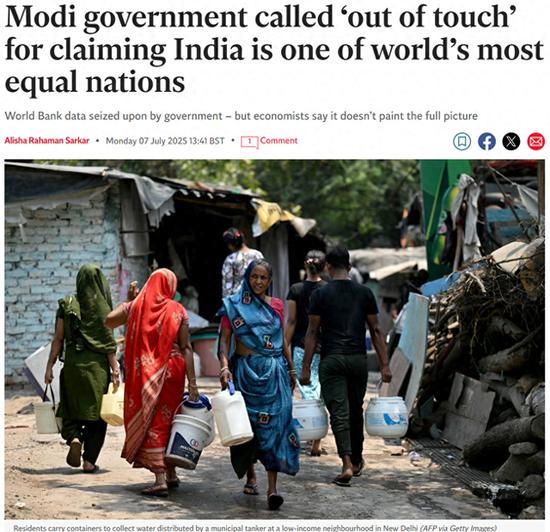
According to a report by the British “Independent” on July 7th, the Indian government recently claimed that India is one of the “most egalitarian countries in the world,” which has drawn criticism from the opposition party, the National Democratic Alliance (NDA), accusing the Modi government of “distorting data” and “completely detaching from reality.”
On May 5th, local time, the Federal Information Bureau of India released a statement, citing World Bank data, stating that India’s level of income equality ranks fourth globally, trailing only Slovakia, Slovenia, and Belarus. The statement praised this achievement as “remarkable for a country with a vast territory and high degree of diversity.”
The report highlighted that the World Bank’s “Poverty and Inequality Brief” published in April this year showed a significant decline in extreme poverty rates in India over the past decade, with the proportion of people living below $2.15 per day dropping from 16.2% in 2011-2012 to 2.3% in 2022-2023, lifting approximately 171 million people out of poverty. Additionally, the Gini coefficient based on consumption levels in India decreased from 28.8 to 25.5. However, the report warned that due to data limitations, India’s level of inequality might be underestimated.
Furthermore, the World Bank’s report mentioned that data from the World Inequality Database (WID) indicated that India’s income inequality coefficient has deteriorated continuously over the past 20 years, rising from 52 in 2004 to 62 in 2023. The report revealed that in the fiscal year 2023-2024, the median income of the top 10% of earners in India was about 13 times that of the bottom 10%, highlighting the widening income gap.
The “Independent” reported that although the Indian Prime Minister Modi’s government claimed in its statement that India’s level of income equality ranks “fourth globally,” the World Bank did not include such ranking or similar statements in its report.
On the 6th local time, the Indian National Congress Party criticized on social media platform X, stating that three months after the World Bank report was released, the Modi government began “distorting data” and claimed that India is one of the “most equal countries in the world,” a claim that “is completely out of touch with reality.” Jairam Ramesh, the party’s secretary-general, stated that any country with a poverty rate as high as 28.1% has “no right to claim itself as one of the most equal countries in the world.” He also mentioned that the Modi government used the purchasing power parity (PPP) conversion factor updated in 2021 instead of the 2017 data, which resulted in an overestimation of the poverty reduction achievements. He believes that using more accurate data would actually lead to an increase in extreme poverty rates.
The Indian news website “The Wire” reported that according to the World Bank’s income inequality data, India’s Gini coefficient for 2019 and 2023 were both 61, ranking 176 out of 216 countries and regions globally, behind the 115th rank in 2009.
Furthermore, the Congress Party questioned the poverty line standard used by the Modi government during its calculations. Based on the World Bank’s daily poverty line of $3.65, India’s poverty rate in 2022 was 28.2%, significantly higher than the 5.3% calculated at the daily $3 standard used by the Modi government.